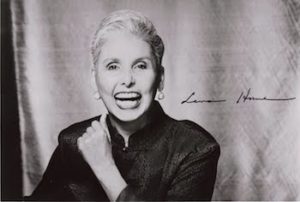
Lena Horne
This date marks the birthday of Lena Horne in 1917. She was a Black singer and actress.
Lena Mary Calhoun Horne was born in Brooklyn. Her father, Ted Horne, left home when she was only three, and her mother, Edna Scotton, left soon after. This left young Lena in the care of her paternal grandmother, Cora Calhoune Horne, a civil rights activist and suffragist in Brooklyn. Horne's mother remarried, and the family returned to New York, where Horne attended high school. However, financial difficulties forced her to quit school and obtain a position as a chorus dancer at the Cotton Club in Harlem.
During this time, she spent summers visiting her uncle, poet Frank Horne. She was hired for her beauty, but she worked diligently to improve her singing and became known for her sultry voice. In 1934, Horne accepted a Broadway role and left to sing with Noble Sissle's Society Orchestra in Philadelphia. There, she was reunited with her father, who had played a significant role in her life and career until his death in 1970. It was through her father that Horne met Louis Jones, whom she married in 1937. The couple had two children, Gail and Teddy, but divorced in 1941.
Horne left New York to perform at the Trocadero Club in California. Within a short time, she signed a Hollywood movie contract with Metro-Goldwyn-Mayer. She insisted that her contract stipulate that she would not be cast in stereotypical Black roles, and, with her elegance and glamour, she became known for transforming the image of the Black woman in the film. Like many who followed, her first role in 1942 was a guest spot in “Panama Hattie,” but the same year, she played a leading part in “Cabin in the Sky.” In 1943, she was in three films: “I Dood It,” “Thousands Cheer,” and “Stormy Weather,” the title song of which became her trademark. Horne met Lennie Hayton on the “Stormy Weather” set.
Though the couple married in 1947, the controversial interracial marriage was not publicly announced until 1950. She appeared in “Two Girls and a Sailor “(1944), “Broadway Rhythm” (1944), “Ziegfeld Follies” of 1945 and 1946, “The Duchess of Idaho” (1950), and “Meet Me in Las Vegas” (1956), her first speaking part. She also starred in the Broadway show “Jamaica” (1957) and appeared on several television shows in the 1950s. She had a role in the 1978 movie "The Wiz." Horne won many honors for her performances, including a Grammy for the album based on her award-winning show “Lena Horne: The Lady and Her Music,” which began in 1981 and became the longest-running one-woman show in Broadway history.
In addition to the Kennedy Center Award for Lifetime Achievement in the Arts (1984), Horne received an honorary doctorate from Howard University, an Image Award, and a Spingarn Medal from the NAACP. Lena Horne, whose refusal to be cast in stereotypical roles helped transform the popular image of black women, died on Mother's Day, May 9, 2010.
Black Women in America: An Historical Encyclopedia
Volumes 1 and 2, edited by Darlene Clark Hine
Copyright 1993, Carlson Publishing Inc., Brooklyn, New York
ISBN 0-926019-61-9
All Media Guide
1168 Oak Valley Drive
Ann Arbor, MI 48108 USA